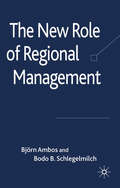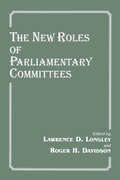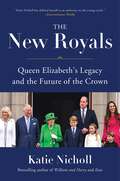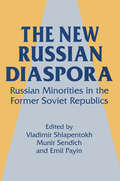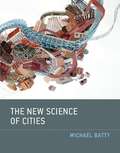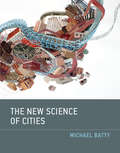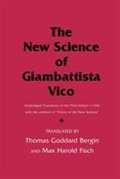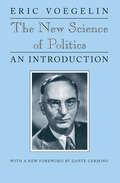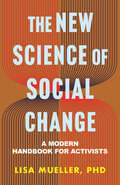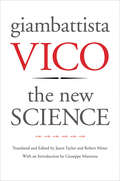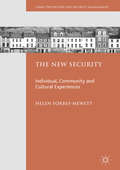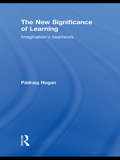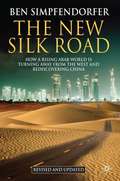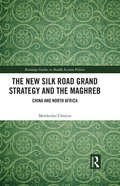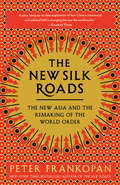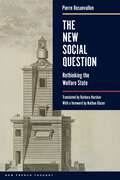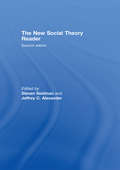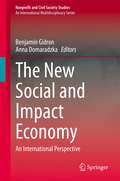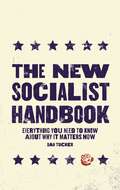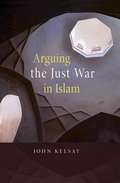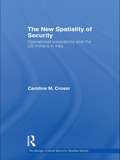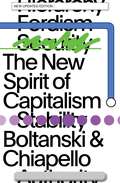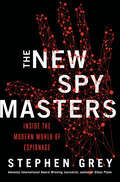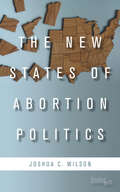- Table View
- List View
The New Role of Regional Management
by Bodo B. Schlegelmilch Björn AmbosRegional management has taken on a new role and is becoming more important. This book explores the challenges of European, US and Asian companies. It outlinines how regional headquarters can develop into Dynamic Competence Relay centers to master these challenges.
The New Roles of Parliamentary Committees
by Roger H. Davidson Lawrence D. LongleyParliaments had been expected to decline in significance at the end of the 20th century, but instead they have developed new and vital political roles and have innovated their institutional structure in parliamentary committees, not only in a few parliaments, but as a global phenomenon.
The New Royals: Queen Elizabeth's Legacy and the Future of the Crown
by Katie NichollVanity FairRoyals correspondent and bestselling author ofWilliam and HarryandKateexplores the remarkable life and legacy of Queen Elizabeth II, with new chapters to include the last few months of her reign, and the rise of King Charles III. For seventy years, Queen Elizabeth ruled over an institution and a family. During her lifetime she was constant in her desire to provide a steady presence and to be a trustworthy steward of the British people and the Commonwealth. In the face of her uncle&’s abdication, in the uncertainty of the Blitz, and in the tentative exposure of her family and private life to the public via the press, Elizabeth became synonymous with the crown. But times change. Recent years have brought grief and turmoil to the House of Windsor, and even as England celebrated the Queen&’s Platinum Jubilee, there were calls for a changing of the guard. In The New Royals, journalist Katie Nicholl provides a nuanced look at Elizabeth&’s remarkable and unrivalled reign, with new stories from Palace courtiers and aides, documentarians, and family members. She examines King Charles and Queen Consort Camilla&’s decades in waiting and beyond—where &“The Firm&” is headed as William and Kate present the modern faces of an ancient institution. In the wake of Harry and Meghan leaving the Royal Family and Prince Andrew&’s spectacular fall from grace, the royal family must reckon with its history, the light and the dark, in order to chart a course for Britain beyond its Queen and to show that it is an institution capable of leadership in an ever-changing modern world.
The New Russian Diaspora: Russian Minorities in the Former Soviet Republics
by Vladimir Shlapentokh Munir Sendich Emil PayinIn the wake of the USSR's collapse, more than 25 million Russians found themselves living outside Russian territory, their status ambiguous. Equally uncertain is the role they will play as a factor in Russian politics, local politics and relations among the newly independent states of the former Soviet Union. This volume, prepared under the sponsorship of the Kennan Institute, offers a comprehensive and amply documented examination of these issues.
The New Science of Cities
by Michael BattyIn "The New Science of Cities," Michael Batty suggests that to understand cities we must view them not simply as places in space but as systems of networks and flows. To understand space, he argues, we must understand flows, and to understand flows, we must understand networks -- the relations between objects that comprise the system of the city. Drawing on the complexity sciences, social physics, urban economics, transportation theory, regional science, and urban geography, and building on his own previous work, Batty introduces theories and methods that reveal the deep structure of how cities function. Batty presents the foundations of a new science of cities, defining flows and their networks and introducing tools that can be applied to understanding different aspects of city structure. He examines the size of cities, their internal order, the transport routes that define them, and the locations that fix these networks. He introduces methods of simulation that range from simple stochastic models to bottom-up evolutionary models to aggregate land-use transportation models. Then, using largely the same tools, he presents design and decision-making models that predict interactions and flows in future cities. These networks emphasize a notion with relevance for future research and planning: that design of cities is collective action.
The New Science of Cities (The\mit Press Ser.)
by Michael BattyA proposal for a new way to understand cities and their design not as artifacts but as systems composed of flows and networks.In The New Science of Cities, Michael Batty suggests that to understand cities we must view them not simply as places in space but as systems of networks and flows. To understand space, he argues, we must understand flows, and to understand flows, we must understand networks—the relations between objects that compose the system of the city. Drawing on the complexity sciences, social physics, urban economics, transportation theory, regional science, and urban geography, and building on his own previous work, Batty introduces theories and methods that reveal the deep structure of how cities function.Batty presents the foundations of a new science of cities, defining flows and their networks and introducing tools that can be applied to understanding different aspects of city structure. He examines the size of cities, their internal order, the transport routes that define them, and the locations that fix these networks. He introduces methods of simulation that range from simple stochastic models to bottom-up evolutionary models to aggregate land-use transportation models. Then, using largely the same tools, he presents design and decision-making models that predict interactions and flows in future cities. These networks emphasize a notion with relevance for future research and planning: that design of cities is collective action.
The New Science of Giambattista Vico: Unabridged Translation of the Third Edition (1744) with the addition Of "Practice of the New Science"
by Giambattista Vico Thomas Goddard Bergin Max Harold FischA pioneering treatise that aroused great controversy when it was first published in 1725, Vico's New Science is acknowledged today to be one of the few works of authentic genius in the history of social theory. It represents the most ambitious attempt before Comte at comprehensive science of human society and the most profound analysis of the class struggle prior to Marx.
The New Science of Politics: An Introduction (Walgreen Foundation Lectures)
by Eric Voegelin&“Must be considered one of the most enlightening essays on the character of European politics that has appeared in half a century… powerful and vivid.&”—Times Literary Supplement &“Thirty-five years ago few could have predicted that The New Science of Politics would be a best-seller by political theory standards. Compressed within the Draconian economy of the six Walgreen lectures is a complete theory of man, society, and history, presented at the most profound and intellectual level…Voegelin&’s [work] stands out in bold relief from much of what has passed under the name of political science in recent decades…The New Science is aptly titled, for Voegelin makes clear at the outset that a &‘return to the specific content&’ of premodern political theory is out of the question…The subtitle of the book, An Introduction, clearly indicates that The New Science of Politics is an invitation to join the search for the recovery of our full humanity.&”—From the new foreword by Dante Germino &“One of the most distinguished interpreters to Americans of the non-liberal streams of European thought…brilliant insights.&”—American Political Science Review
The New Science of Social Change: A Modern Handbook for Activists
by Lisa MuellerIn this accessible guide for activists, scholar Lisa Mueller translates cutting-edge empirical research on effective protest to show how to make movements really matterWe are in the middle of a historic swell of activism taking place throughout the world. From Occupy Wall Street and the Arab Spring, to pro-democracy uprisings in China, Black Lives Matter, the Women&’s March on Washington, and more recent pro-choice protests; folks everywhere are gathering to demand a more just world. Yet despite social engagement being at record highs, there is a divide between the activist community and the scientists—like Lisa Mueller, PhD—who study it.In The New Science of Social Change, Mueller highlights what really works when it comes to group advocacy, to place proven tools in the hands of activists on the ground—in the U.S. and abroad. Drawing on both her decade-long career researching the science of protest and the work of other scholars, she stresses such things as the ingredients of collective action and how protests with cohesive demands are significantly more likely to win concessions than protests with mixed demands. Incorporating interactive exercises and the voices of experienced activists with her analysis, Mueller shows how a working knowledge of social science can help activists implement more effective strategies to create the real-world changes we want to see.
The New Science: The First New Science (Cambridge Texts In The History Of Political Thought Ser.)
by Giambattista VicoA fresh translation of The New Science, with detailed footnotes that will help both the scholar and the new reader navigate Vico&’s masterpieceThe New Science is the major work of Italian philosopher Giambattista Vico. First published in 1725 and revised in 1730 and 1744, it calls for a reinterpretation of human civilization by tracing the stages of historical development shared by all societies. Almost unknown during his lifetime, the work had a profound influence on later thinkers, from Montesquieu and Marx to Joyce and Gadamer. This edition offers a fresh translation and detailed annotations which enable the reader to track Vico&’s multiple allusions to other texts. The introduction situates the work firmly within a contemporary context and newly establishes Vico as a thinker of modernity.
The New Security: Individual, Community And Cultural Experiences (Crime Prevention and Security Management)
by Helen Forbes-MewettThe New Security places the concept of ‘security’ under the spotlight to analyse its meaning in an original and contemporary context. In so doing, Forbes-Mewett revisits the notion from the perspectives of individuals and communities to understand what security means in our culturally diverse, contemporary society. Chapters highlight the extent of the shift of traditional uses of the term from the established perspective of international relations to a more commonly used concept which now broadly relates to many aspects of peoples’ everyday experiences. Based on empirical studies of security in relation to housing, employment, food, personal security and campus settings in times of perceived heightened risk, this book presents new and different ways of thinking about security to demonstrate how we need to expand the dialogue surrounding the concept. Drawing on empirical research to describe, analyse and reposition the concept of security to have meaning in diverse everyday contexts, this methodological and insightful text will be of particular interest to scholars and students of criminological theory, security studies and sociology.
The New Significance of Learning: Imagination's Heartwork
by Pádraig HoganShould education be understood mainly as a practice in its own right, or is it essentially a subordinate affair to be shaped and controlled by a society’s powers-that-be? What difference does it make if students are chiefly viewed as recipients of a set of skills and knowledge, or as active participants in their own learning? Does education have a responsibility in cultivating humanity’s maturity, or are its purposes to be effectively matched to the functional requirements of a globalized age? The New Significance of Learning explores these and other high-stakes questions. It challenges hierarchical and custodial conceptions of education that have been inherited as the ‘natural order’ of things. It discloses a more original and imaginative understanding of educational practice, illustrating this understanding with frequent practical examples. Among the merits highlighted by this approach are: a recognition that education is first and foremost an invitation to join a renewed experience of quest and disclosure; a realisation that taking up and pursuing such an invitation is a basic right, as distinct from a privilege to be bestowed or withheld; an awareness of the decisive importance of specific kinds relationships in practices of teaching and learning; an emphasis on the human qualities as well as the intellectual achievements nourished by dedicated communities of learning; an acknowledgement of partiality – of incompleteness and bias – in even the best of humankind’s learning efforts; the emergence of a distinctive ethical orientation for education as a practice in its own right.
The New Silk Road
by Ben SimpfendorferThe rise of the Arab world and China are part of the same story, once trading partners via the Silk Road. This is a fully revised and updated account of how China is spurring growth in the Arab world, taking into account new developments that have taken place since the first edition.
The New Silk Road Grand Strategy and the Maghreb: China and North Africa (Routledge Studies in Middle Eastern Politics)
by Mordechai ChazizaExamining Chinese-North African relations through the lens of President Xi Jinping’s Silk Road grand strategy, this book offers a comprehensive analysis of emerging strategic and economic partnerships in the Maghreb region. China’s ‘Belt and Road Initiative’ (BRI) is one of the most ambitious infrastructure projects in modern history. This book argues that the BRI framework is vital in understanding the shifting balance of power within the Maghreb region and between the North African countries, the EU, the US, and China. It is argued that an increasing interdependence can be observed between China and the Maghreb in energy, construction, infrastructure building, political ties, trade and investments, financial integration, people-to-people bonds, and defence. The author reveals the complexities and challenges of Beijing's BRI, exploring how this synergy will shape the Maghreb in the future. Additionally, the book argues that the balance of global politics will be critically affected by these emerging partnerships. The book will be of particular interest to students and academics focused on interstate dynamics and foreign policy in the West Asia and North Africa (WANA) region, but in its global ramifications the book is also much-needed reading for those working in International Relations, Politics and Economics, and Public Policy.
The New Silk Roads: The Present and Future of the World
by Peter FrankopanFrom the bestselling author of The Silk Roads comes a new, timely, and visionary book about the dramatic and profound changes our world is undergoing right now--as seen from the perspective of the rising powers of the East."All roads used to lead to Rome. Now they lead to Beijing." So argues Peter Frankopan in this revelatory new book.In the age of Brexit and Trump, the West is buffeted by the tides of isolationism and fragmentation. Yet to the East, this is a moment of optimism as a new network of relationships takes shape along the ancient trade routes. In The New Silk Roads, Peter Frankopan takes us on an eye-opening journey through the region, from China's breathtaking infrastructure investments to the flood of trade deals among Central Asian republics to the growing rapprochement between Turkey and Russia. This important book asks us to put aside our preconceptions and see the world from a new--and ultimately hopeful--perspective.
The New Social Division: Making and Unmaking Precariousness (Palgrave Studies in European Political Sociology)
by Donatella Della Porta Tiina Silvasti Sakari Hänninen Martti SiisiäinenThis volume addresses issues of precariousness in a broad, interdisciplinary perspective, looking at socio-economic transformations as well as the identity formation and political organizing of precarious people. The collection bridges empirical research with social theory to problematize and analyse the precariat.
The New Social Question: Rethinking the Welfare State (New French Thought Series #49)
by Pierre RosanvallonHow social and intellectual changes undermine our justifications for the welfare state The welfare state has come under severe pressure internationally, partly for the well-known reasons of slowing economic growth and declining confidence in the public sector. According to the influential social theorist Pierre Rosanvallon, however, there is also a deeper and less familiar reason for the crisis of the welfare state. He shows here that a fundamental practical and philosophical justification for traditional welfare policies—that all citizens share equal risks—has been undermined by social and intellectual change. If we wish to achieve the goals of social solidarity and civic equality for which the welfare state was founded, Rosanvallon argues, we must radically rethink social programs.Rosanvallon begins by tracing the history of the welfare state and its founding premise that risks, especially the risks of illness and unemployment, are equally distributed and unpredictable. He shows that this idea has become untenable because of economic diversification and advances in statistical and risk analysis. It is truer than ever before—and far more susceptible to analysis—that some individuals will face much greater risks than others because of their jobs and lifestyle choices. Rosanvallon argues that social policies must be more narrowly targeted. And he draws on evidence from around the world, in particular France and the United States, to show that such programs as unemployment insurance and workfare could better reflect individual needs by, for example, making more explicit use of contracts between the providers and receivers of benefits. His arguments have broad implications for welfare programs everywhere and for our understanding of citizenship in modern democracies and economies.
The New Social Theory Reader
by Steven Seidman; Jeffrey C. AlexanderThis is the first anthology to thematize the dramatic upward and downward shifts that have created the new social theory, and to present this new and exciting body of work in a thoroughly trans-disciplinary manner. In this revised second edition readers are provided with a much greater range of thinkers and perspectives, including new sections on such issues as imperialism, power, civilization clash, health and performance. The first section sets out the main schools of contemporary thought, from Habermas and Honneth on new critical theory, to Jameson and Hall on cultural studies, and Foucault and Bourdieu on poststructuralism. The sections that follow trace theory debates as they become more issues-based and engaged. They are:the post-foundational debates over morality, justice and epistemological truththe social meaning of nationalism, multiculturalism and globalizationidentity debates around gender, sexuality, race, the self and post-coloniality.This new edition provides more ample biographical and intellectual introductions to each thinker, and substantial introductions to each of the major sections. The editors introduce the volume with a newly revised, interpretive overview of social theory today.The New Social Theory Reader is an essential, reliable guide to current theoretical debates.
The New Social and Impact Economy: An International Perspective (Nonprofit and Civil Society Studies)
by Benjamin Gidron Anna DomaradzkaThis edited volume discusses the development of the new social and impact economy in ten countries around the globe. The new social and impact economy is an attempt to conceptualize developments after the 2008 economic crisis, which emphasized the pifalls of the Neo-Liberal economic system. In the aftermath of the crisis, new organizational entities evolved, which combined social and business objectives as part of their mission. Using data gathered by two recent international research projects—the ICSEM project and the FAB-MOVE project—the book provides an initial portrait of the forces at play in the evolution of the new social and impact economy, linking those to the past crisis as well as to Covid19 and comparing the emergence of the phenomenon in a varied group of countries. The book begins with an overview of the classical definitions of social economy and proposes a comprehensive concept of new social and impact economy, its characteristics, and sources. Ten country chapters as well as a comparative chapter on international social economy organizations follow. The volume concludes with an overall analysis of the data from the country chapters, forming a typology of social economy traditions and linking it to recent Post Capitalism trends. Creating a conceptual framework to analyze the new phenomena in social economy, this volume is ideal for academics and practitioners in the fields of social economy; social, economic and welfare policies; social and business entrepreneurship in a comparative fashion; social and technological innovation as well as CSR specialists and practitioners.
The New Socialist Handbook: Everything You Need to Know About Why It Matters Now
by Dan TuckerLearn the core principles of socialism -- one of the world's most misunderstood ideologies -- with this easy-to-follow guide for today's political conversation.From Bernie Sanders' presidential campaign to Alexandria Ocasio-Cortez's Green New Deal, the U.S. is witnessing a leftward shift that hasn't been seen for decades. But how many Americans truly understand socialism and socialist principles? The New Socialist Handbook is a simple way to learn about this political system and bear witness to its current movement with an educated and informed mind. It discusses topics such as:Different types of socialism (democratic socialism vs. social democracy vs. eco-socialism, etc.);How socialism became a dirty word;Which countries are socialist or have socialist programs;The way socialism exists in the U.S. today (Medicare, Social Security, etc.);Socialist suggestions for today's issues (healthcare, infrastructure, economy, etc.);What can you do to bring about change? (getting involved in politics, educating yourself, demonstrating, etc.)Perfect for the engaged voter or the armchair political scientist, pundit, enthusiast, or anyone simply looking to get a better intellectual grasp on socialism, The New Socialist Handbook gives meaning and definition to the commonly misunderstood. Author Dan Tucker breaks down these topics in a clear, accessible way and without a political slant. Readers will come away with a better understanding of the history of socialism and what it means in our world today.
The New Sovereignty: Compliance with International Regulatory Agreements
by Abram Chayes Antonia Handler ChayesIn an increasingly complex and interdependent world, states resort to a bewildering array of regulatory agreements to deal with problems as disparate as climate change, nuclear proliferation, international trade, satellite communications, species destruction, and intellectual property. In such a system, there must be some means of ensuring reasonably reliable performance of treaty obligations. The standard approach to this problem, by academics and politicians alike, is a search for treaties with "teeth"--military or economic sanctions to deter and punish violation. The New Sovereignty argues that this approach is misconceived. Cases of coercive enforcement are rare, and sanctions are too costly and difficult to mobilize to be a reliable enforcement tool. As an alternative to this "enforcement" model, the authors propose a "managerial" model of treaty compliance. It relies on the elaboration and application of treaty norms in a continuing dialogue between the parties--international officials and nongovernmental organizations--that generates pressure to resolve problems of noncompliance. In the process, the norms and practices of the regime themselves evolve and develop. The authors take a broad look at treaties in many different areas: arms control, human rights, labor, the environment, monetary policy, and trade. The extraordinary wealth of examples includes the Iran airbus shootdown, Libya's suit against Great Britain and the United States in the Lockerbie case, the war in Bosnia, and Iraq after the Gulf War. The authors conclude that sovereignty--the status of a recognized actor in the international system--requires membership in good standing in the organizations and regimes through which the world manages its common affairs. This requirement turns out to be the major pressure for compliance with treaty obligations. This book will be an invaluable resource and casebook for scholars, policymakers, international public servants, lawyers, and corporate executives.
The New Spatiality of Security: Operational Uncertainty and the US Military in Iraq (Routledge Critical Security Studies)
by Caroline M. CroserThis book provides a rigorous critical analysis of how the US military operates in Iraq, exploring the spatial practices of violence. Contemporary critical analyses of the United States’ involvement in Iraq and Afghanistan emphasise the hegemonic nature of the US military experience, while conventional military analyses focus on fixed categories such as ‘counter-insurgency’ or ‘network-centric warfare’. Drawing on fieldwork examining the use of a new command and control technology by 1st Cavalry Division (US Army) in 2004-2005, this book elaborates a more nuanced understanding of US military violence by exploring the changing (and sometimes incoherent) spatial practices through which violence was exercised. The author combines fieldwork with a spatial vocabulary of violence from the work of Michel Foucault, Henri Lefebvre and Gilles Deleuze and Félix Guattari and methodological inspiration from the micro-observations of material semiotics in Science and Technology Studies to conclude that the US Army’s experience in Iraq has been neither as circumscribed nor as easily defined as critical theorists and conventional military analysts alike would suggest. This innovative book will be of much interest to students of critical security studies, strategic studies, military studies, social and spatial theory and IR in general. Caroline M. Croser is a Lecturer in Politics at the University of New South Wales at the Australian Defence Force Academy, where she teaches defence studies.
The New Spirit of Capitalism
by Gregory Elliott Luc Boltanski Eve ChiapelloNew edition of this major work examining the development of neoliberalismIn this major work, sociologists Luc Boltanski and Eve Chiapello go to the heart of the changes in contemporary capitalism. Via an unprecedented analysis of the latest management texts that have formed the thinking of employers in their reorganization of business, the authors trace the contours of a new spirit of capitalism. They argue that from the middle of the 1970s onwards, capitalism abandoned the hierarchical Fordist work structure and developed a new network-based form of organization that was founded on employee initiative and autonomy in the workplace—a “freedom” that came at the cost of material and psychological security. The authors connect this new spirit with the children of the libertarian and romantic currents of the late 1960s (as epitomised by dressed-down, cool capitalists such as Bill Gates and “Ben and Jerry”) arguing that they practice a more successful and subtle-form of exploitation. Now a classic work charting the sociological structure of neoliberalism, Boltanski and Chiapello show how the new spirit triumphed thanks to a remarkable recuperation of the left’s critique of the alienation of everyday life that simultaneously undermined their “social critique.”In this new edition, the two author reflect on the reception of the book and the debates it has stimulated.
The New Spymasters: Inside the Modern World of Espionage
by Stephen GreyThe old world of spying-dead-letter boxes, microfilm cameras, an enemy reporting to the Moscow Center, and a hint of sexual blackmail-is history. The spymaster's technique has changed and the enemy has, too. He or she now frequently comes from a culture far removed from Western understanding and is part of a less well-organized group. The new enemy is constantly evolving and prepared to kill the innocent. In the face of this new threat, the spymasters of the world shunned human intelligence as the primary way to glean clandestine information and replaced it with an obsession that focuses on the technical methods of spying ranging from the use of high-definition satellite photography to the global interception of communications. However, this obsession with technology has failed, most spectacularly, with the devastation of the 9/11 attacks. In this searing modern history of espionage, Stephen Grey takes us from the CIA's Cold War legends, to the agents who betrayed the IRA, through to the spooks inside Al-Qaeda and ISIS. Techniques and technologies have evolved, but the old motivations for betrayal-patriotism, greed, revenge, compromise-endure. Based on years of research and interviews with hundreds of secret sources, Stephen Grey's The New Spymasters is an up-to-date exposé that shows how spycraft's human factor is once again being used to combat the world's deadliest enemies.
The New States of Abortion Politics
by Joshua WilsonThe 2014 Supreme Court ruling on McCullen v. Coakley striking down a Massachusetts law regulating anti-abortion activism marked the reengagement of the Supreme Court in abortion politics. A throwback to the days of clinic-front protests, the decision seemed a means to reinvigorate the old street politics of abortion. The Court's ruling also highlights the success of a decades' long effort by anti-abortion activists to transform the very politics of abortion. The New States of Abortion Politics, written by leading scholar Joshua C. Wilson, tells the story of this movement, from streets to legislative halls to courtrooms. With the end of clinic-front activism, lawyers and politicians took on the fight. Anti-abortion activists moved away from a doomed frontal assault on Roe v. Wade and adopted an incremental strategy--putting anti-abortion causes on the offensive in friendly state forums and placing reproductive rights advocates on the defense in the courts. The Supreme Court ruling on Whole Woman's Health v. Hellerstedt in 2016 makes the stakes for abortion politics higher than ever. This book elucidates how--and why.
